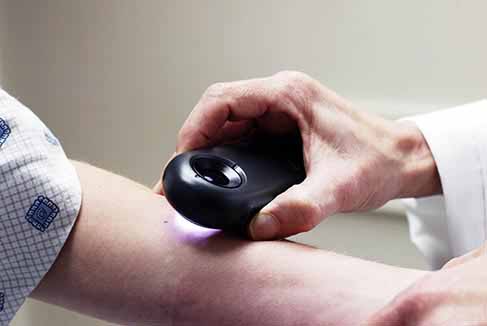How can I prevent cancer?
Knowing your risk, reducing your risk and staying healthy, understanding cancer screening recommendations and having a plan for ongoing health care after a cancer diagnosis are all fundamental in cancer prevention.
Updated February 2022
Healthy habits are the key to cancer prevention
Up to two-thirds of all cancers may be preventable
- Avoid tobacco
- Limit sun exposure and protect your skin
- Maintain a healthy weight
- Eat five to nine servings daily of fruits and vegetables
- Be physically active
- Limit or avoid alcohol
- Get cancer-preventing vaccines, such as the HPV and Hepatitis B vaccines
Some people still may get cancer, even with healthy habits
Genetics and certain infections may play a role
- Know your family’s history of disease – and tell your doctor
- Some viruses and bacteria (like HPV or H. Pylori ) may increase your risk
- Get regular cancer screening exams
- Ask your doctor how to reduce your cancer risk
Screening Guidelines
Recommended by The University of Texas MD Anderson Cancer Center
- Breast Cancer
- Cervical Cancer
- Colorectal Cancer
- Endometrial Cancer
- Liver Cancer
- Lung Cancer
- Ovarian Cancer
- Prostate Cancer
- Skin Cancer
Vaccines
Vaccines also help reduce cancer risk. The human papillomavirus (HPV) vaccine prevents cervical, anal, vaginal and vulvar cancers and anal and genital warts associated with certain types of HPV. The HPV vaccine may also reduce the risk of other HPV-related premalignant and malignant lesions of the oropharynx and penis. The hepatitis B vaccine can help reduce liver cancer risk. For more information on vaccines, visit
Genetic Testing and Counseling
About 5-10% of all cancers are inherited. If you think you might be at risk for an inherited cancer, it's a good idea to meet with a genetics counselor for an assessment.
- Common cancers associated with family history are: breast, colorectal, ovarian, prostate and endocrine cancer.
- Often, people at risk for an inherited form of cancer are of Ashkenazi (Eastern European) Jewish ancestry or have family members who were diagnosed with:
- Cancer at an early age
- The same type of cancer
- Two or more different cancers in the same person
- A rare cancer, such as male breast cancer or sarcoma
- A BRCA1 or BRCA2 mutation
For more information on genetic testing, visit
MD Anderson Cancer Center - Genetic Testing.
Chemoprevention
Chemoprevention is a way to prevent or delay the development of cancer by taking medicines, vitamins or other agents. Speak with your doctor about your risks for developing cancer, as well as the potential harms and benefits associated with taking chemopreventive agents. Your doctor can help decide if chemoprevention is right for you.


